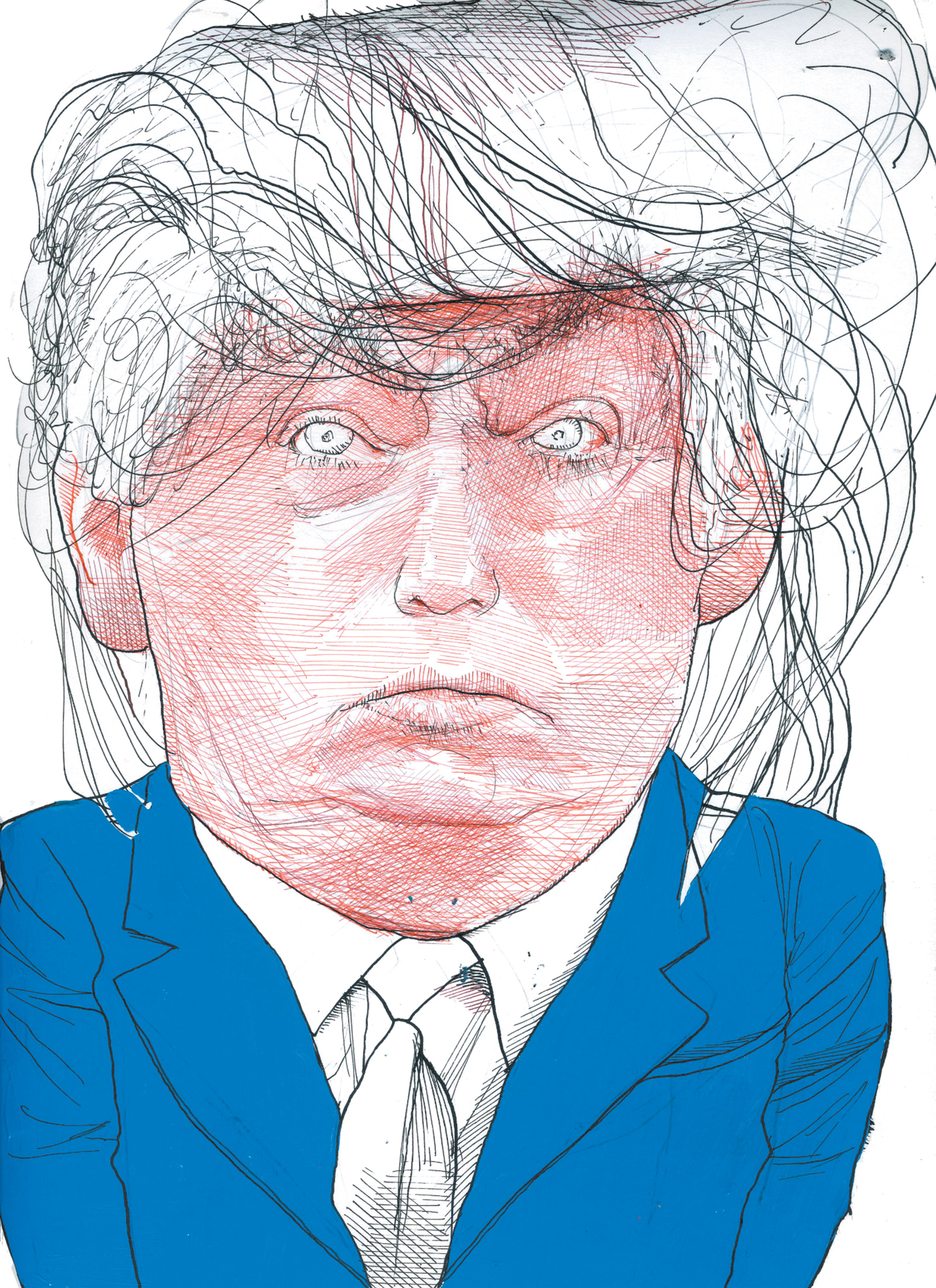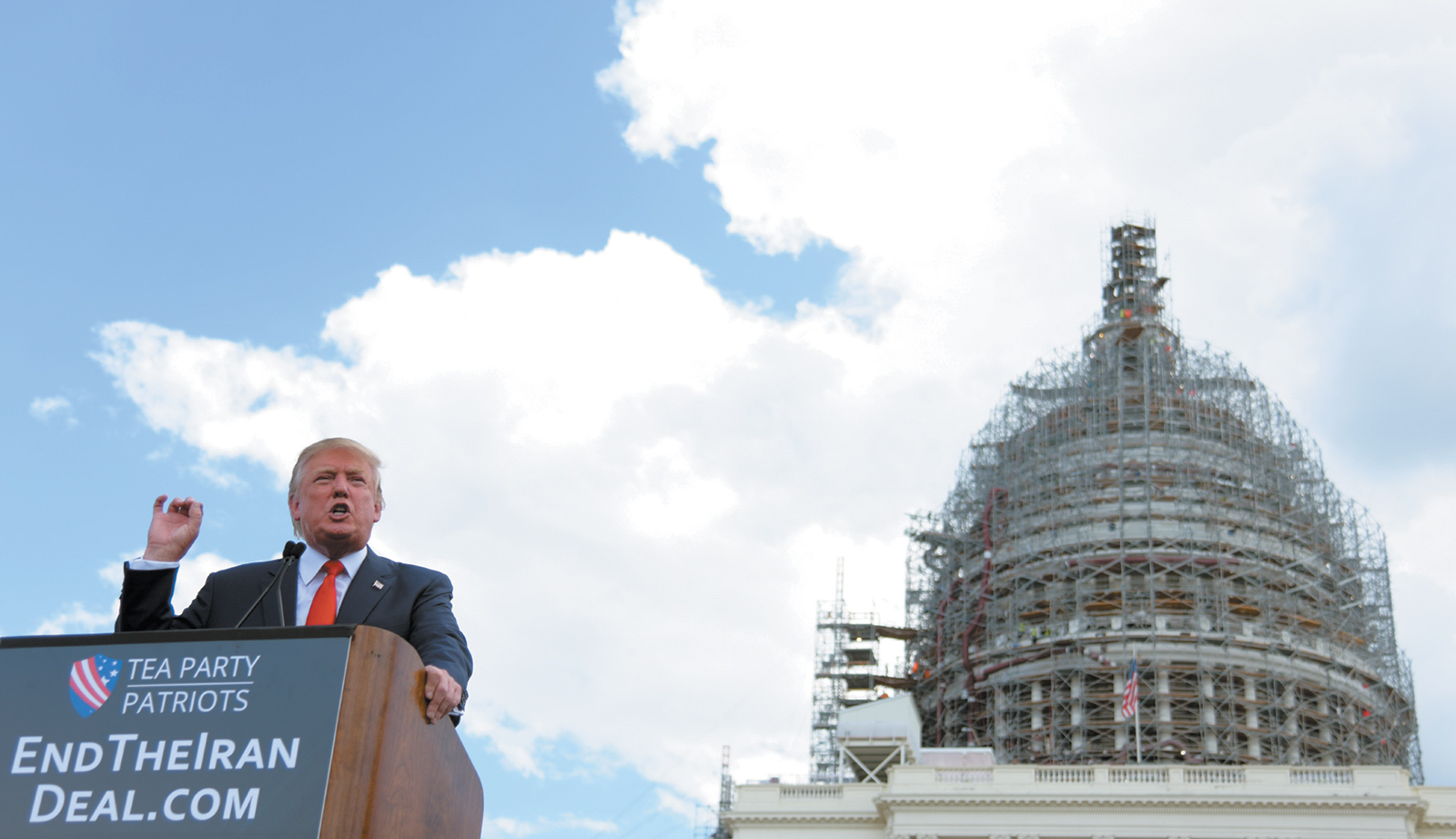I recently offered to tutor Donald Trump on nuclear matters. To put things clearly, I went on his website and in the place where you could send comments, I began mine by saying that on these things he did not seem to know his ass from a wheel. I felt that as a person who seems to like straight talk he might appreciate my candor. I then went on to say that while I was not a supporter I would, as a physicist, be willing to tutor him so he would have a clearer understanding of the issue. I have not heard back and the interviews he gave on March 26 to two New York Times reporters—the transcript is available online—show that my services are badly needed.*
One of the reporters was David E. Sanger, who is a very great expert on these matters. He showed in the transcript and a subsequent report an almost Buddhic self-restraint. I wish I had been present when he hung up the phone. The other reporter was Maggie Haberman, formerly of Politico. She began:
I wanted to ask you about some things that you said in Washington on Monday, more recently. But you’ve talked about them a bunch. So, you have said on several occasions that you want Japan and South Korea to pay more for their own defense. You’ve been saying versions of that about Japan for thirty years. Would you object if they got their own nuclear arsenal, given the threat that they face from North Korea and China?
Trump:
Well, you know, at some point, there is going to be a point at which we just can’t do this anymore. And, I know the upsides and the downsides. But right now we’re protecting, we’re basically protecting Japan, and we are, every time North Korea raises its head, you know, we get calls from Japan and we get calls from everybody else, and “Do something.” And there’ll be a point at which we’re just not going to be able to do it anymore. Now, does that mean nuclear? It could mean nuclear. It’s a very scary nuclear world. Biggest problem, to me, in the world, is nuclear, and proliferation. At the same time, you know, we’re a country that doesn’t have money….
We’re not a rich country. We were a rich country with a very strong military and tremendous capability in so many ways. We’re not anymore. We have a military that’s severely depleted. We have nuclear arsenals which are in very terrible shape. They don’t even know if they work. We’re not the same country, Maggie and David, I mean, I think you would both agree.
It is not clear to me exactly what Maggie and David are being asked to agree to. Is it the notion that having nuclear weapons in Japan and South Korea would help alleviate proliferation—his “biggest problem”—or is it that our nuclear arsenals are in “very terrible shape? They don’t even know if they work”? Who gave him this absurd idea? Who is the “they”? Unfortunately these questions were not asked, but Sanger bravely soldiered on:
So, just to follow Maggie’s thought there, though, the Japanese view has always been, if the United States, at any point, felt as if it was uncomfortable defending them, there has always been a segment of Japanese society, and of Korean society that said, “Well, maybe we should have our own nuclear deterrent, because if the US isn’t certain, we need to make sure the North Koreans know that.” Is that a reasonable position? Do you think at some point they should have their own arsenal?
Trump replies:
Well, it’s a position that we have to talk about, and it’s a position that at some point is something that we have to talk about, and if the United States keeps on its path, its current path of weakness, they’re going to want to have that anyway with or without me discussing it, because I don’t think they feel very secure in what’s going on with our country, David. You know, if you look at how we backed our enemies, it hasn’t—how we backed our allies—it hasn’t exactly been strong. When you look at various places throughout the world, it hasn’t been very strong. And I just don’t think we’re viewed the same way that we were twenty or twenty-five years ago, or thirty years ago. And, you know, I think it’s a problem. You know, something like that, unless we get very strong, very powerful and very rich, quickly, I’m sure those things are being discussed over there anyway without our discussion.
Sanger makes a valiant attempt to get Trump to deal with the question being asked: “And would you have an objection to it?” To which Trump responds:
Advertisement
Um, at some point, we cannot be the policeman of the world. And unfortunately, we have a nuclear world now. And you have, Pakistan has them. You have, probably, North Korea has them. I mean, they don’t have delivery yet, but you know, probably, I mean to me, that’s a big problem. And, would I rather have North Korea have them with Japan sitting there having them also? You may very well be better off if that’s the case. In other words, where Japan is defending itself against North Korea, which is a real problem. You very well may have a better case right there…. You know, one of the things with the, with our Japanese relationship, and I’m a big fan of Japan, by the way. I have many, many friends there. I do business with Japan. But, that, if we are attacked, they don’t have to do anything. If they’re attacked, we have to go out with full force. You understand. That’s a pretty one-sided agreement, right there. In other words, if we’re attacked, they do not have to come to our defense, if they’re attacked, we have to come totally to their defense. And that is a, that’s a real problem.
In short we should encourage the Japanese to have nuclear weapons so that they can come to our defense. Exactly how this fits in with the notion that nuclear proliferation is the biggest problem is not made clear. Maybe there is good proliferation and bad proliferation. (Trump later said that it would be “terrible” if the countries he mentioned fought with nuclear weapons.)
Haberman takes up the line of questioning:
Would you, you were just talking about the nuclear world we live in, and you’ve said many times, and I’ve heard you say it throughout the campaign, that you want the US to be more unpredictable. Would you be willing to have the US be the first to use nuclear weapons in a confrontation with adversaries?
Trump responds:
An absolute last step. I think it’s the biggest, I personally think it’s the biggest problem the world has, nuclear capability. I think it’s the single biggest problem. When people talk global warming, I say the global warming that we have to be careful of is the nuclear global warming. Single biggest that the world has. Power of weaponry today is beyond anything ever thought of, or even, you know, it’s unthinkable, the power. You look at Hiroshima and you can multiply that times many, many times, is what you have today. And to me it’s the single biggest, it’s the single biggest problem.
The discussion inevitably turns to the nuclear deal with Iran—a special bête noire of Trump’s. In the exchanges here he reveals that he does not know some of the basic facts. He makes his often repeated remark that we “gave” the Iranians $150 billion. He surely knows that we “gave back” $150 billion of confiscated funds. This makes less convincing campaign rhetoric. But he adds, “They are, they are now rich, and did you notice they’re buying from everybody but the United States? They’re buying planes, they’re buying everything, they’re buying from everybody but the United States. I would never have made the deal.”
To which Sanger responds, “Our law prevents us from selling to them, sir.”
Trump replies, “Uh, excuse me?”
Sanger answers, “Our law prevents us from selling any planes or, we still have sanctions in the US which would prevent the US from being able to sell that equipment.”
Trump responds:
So, how stupid is that? We give them the money, and we now say, “Go buy Airbus instead of Boeing,” right? So how stupid is that? In itself, what you just said, which is correct by the way, but would they now go and buy, you know, they bought 118 approximately, 118 Airbus planes. They didn’t buy Boeing planes, OK? We give them the money, and we say you can’t spend it in the United States, and create wealth and jobs in the United States. And on top of it, they didn’t, they in theory, I guess, cannot do that, you know, based on what I’ve understood. They can’t do that. It’s hard to believe. We gave them $150 billion and they can’t spend it in our country.
When discussing matters nuclear, Trump often resurrects the memory of his uncle John G. Trump, who was a professor at MIT. Actually he was a professor of electrical engineering who worked on radar in World War II. There is no reason to believe he was an authority on nuclear weapons.
Advertisement
If I ever get the chance to talk to Trump I will try to explain to him that this is not a business deal. (In the interviews he claimed that the Iranians were the number-one trading partners of the North Koreans and that this should have been included. The fact that it is the Chinese who are the number-one trading partners and that they were part of the talks seems to have escaped his attention.) The Iranians were months away from having enough fissile material to make weapons. While it is true that some of the provisions will be phased out, this does not mean that, when they are, a bomb will appear. There would be a substantial time before that could happen, and we would have the chance to consider our response. Meanwhile, I should note that the interview with Trump occurred just before the Nuclear Security Summit in Washington, involving over fifty nations, without Russia, at the end of March.
There is really only one bright spot and that is what happened in Iran. We have not been able to finalize the next stage of our disarmament agreement with the Russians. The North Koreans are surely going to test again. The Indians and Pakistanis are modernizing their arsenals. There is evidence that some Belgian terrorists had their sights on stealing nuclear material. And in the middle of this there is Trump, a colossus of ignorance.
-
*
For the full transcript, see “Transcript: Donald Trump Expounds on His Foreign Policy Views,” The New York Times, March 26, 2016. See also David E. Sanger and Maggie Haberman, “In Donald Trump’s Worldview, America Comes First, and Everybody Else Pays,” The New York Times, March 26, 2016. ↩





